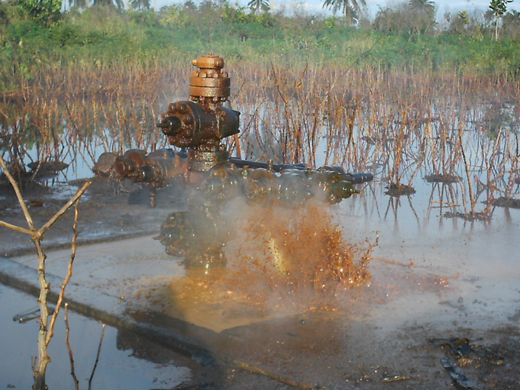Can you imagine drinking water with 8cm of visible oil floating on top? What about water with pollutants 900 times the levels deemed safe by the World Health Organization? Is it tough to imagine growing food on land polluted with oil 5 meters deep? Unfortunately, the people of Ogoniland do not need to imagine; they are forced to live this nightmare day in and day out.
The Ogoni people are an indigenous group who have lived in the Niger Delta region of Nigeria for more than 500 years. They are known for their fierce independence and at one time, depended on fishing and agriculture for subsistence. Once oil was discovered in Nigeria, the Ogoni way of life changed.
Back in 2008 and again in 2009, the Trans Niger Pipeline—owned by Shell Oil—burst. A combined number of 250,000 to 350,000 barrels of oil spilled into the Ogoniland area of the Niger Delta. Just recently, the United Nations Environment Programme (UNEP) announced that Shell Oil and other firms have systematically contaminated 1,000 sq km (386 sq mile) of land. The damage is so severe UNEP estimates it will cost around $1 billion to clean up and 25 to 30 years to restore the environment.
In 2005, Global Greengrants Fund provided a small grant to Movement for the Survival of the Ogoni People (MOSOP) to conduct their own research on the oil spill and to raise awareness on the effects of the oil operations. The UNEP report proves Movement for the Survival of the Ogoni People (MOSOP) was valid in their citations of injustice.
Years later, little clean up has been done.
In August of 2011, Global Greengrants Fund Executive Director Terry Odendahl visited the site of the 2008 spill to bear witness to the pollution that remains. She recalls the image of the water that remains (the community’s primary source of drinking water): “You could stick your hand in the water and it would come out slick with oil.” Terry’s visit came two and three years after the twin ruptures of the Trans Niger Pipeline. During the visit, Nnimmo Bassey, Global Greengrants Fund Board Member and West Africa Advisor, explained that there are over 800,000 environmental refugees from that area alone, many of whom were farmers and herdsmen who can no longer survive off the land.
“Shell’s actions are not just negligent, but criminal.” – Terry Odendahl, Executive Director, Global Greengrants Fund

But the tragedy does not stop there.
Court documents released in 2009 reveal Shell regularly worked with the Nigerian military to suppress resistance to its drilling activities. This involved stopping peaceful protests of the oil pollution and planning raids on opposed communities. Moreover, recent reports claim Shell actually contributed to human rights violations in Nigeria by funding militants who were implicated in the murder and torture of several residents. Drafted by the United Kingdom non-profit, Platform, the report alleges militants were paid large sums of money by Shell that led to violent incidents. One incident resulted in the killing of at least 60 people in the town of Rumuekpe.
The government must act.
From a recent article, “Oil Politics: The Agony of Ogani,” Bassey states:
“Ogoniland (read Niger Delta) ranks as one of the most polluted places on earth. What is urgently needed is for the federal government to declare an environmental state of emergency here. Ecological problems do not observe community or political boundaries. How the government handles this case will tell a lot about who we are as a people.”
